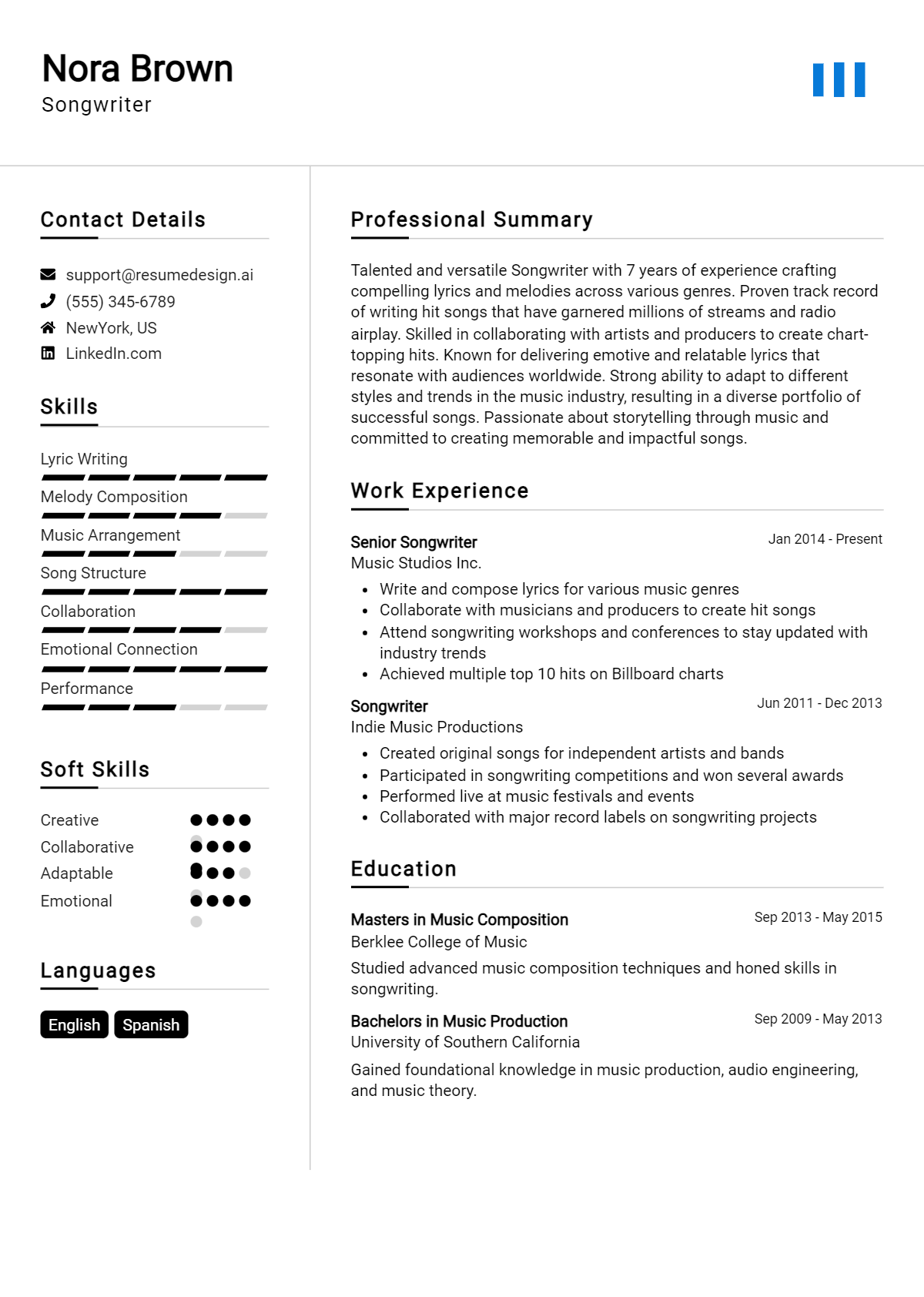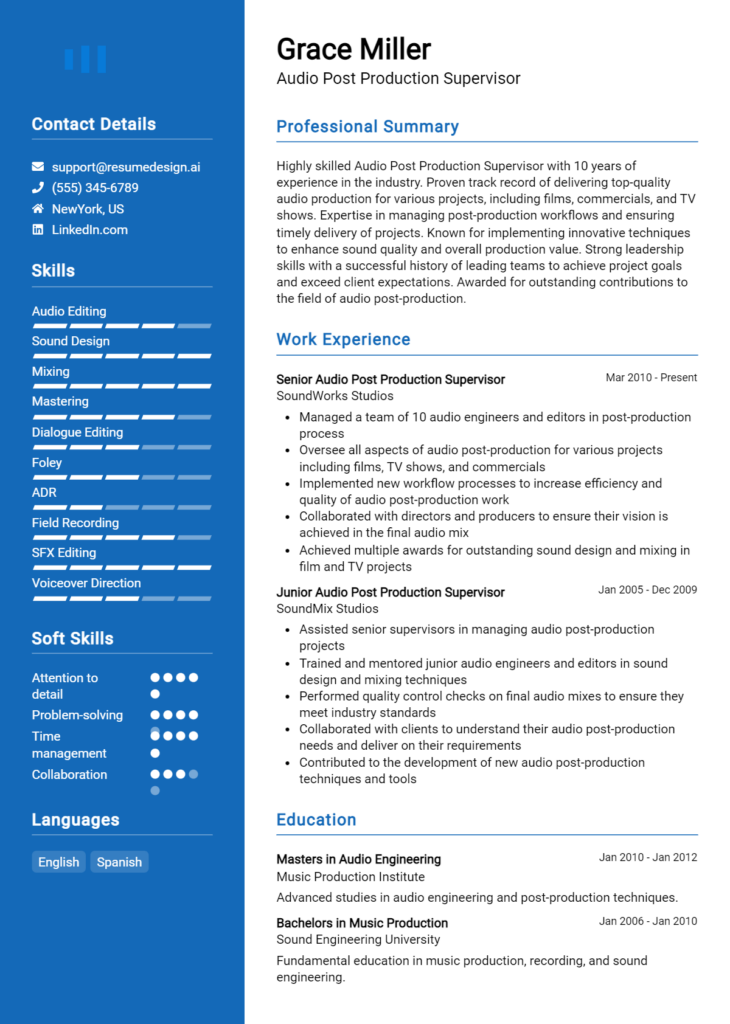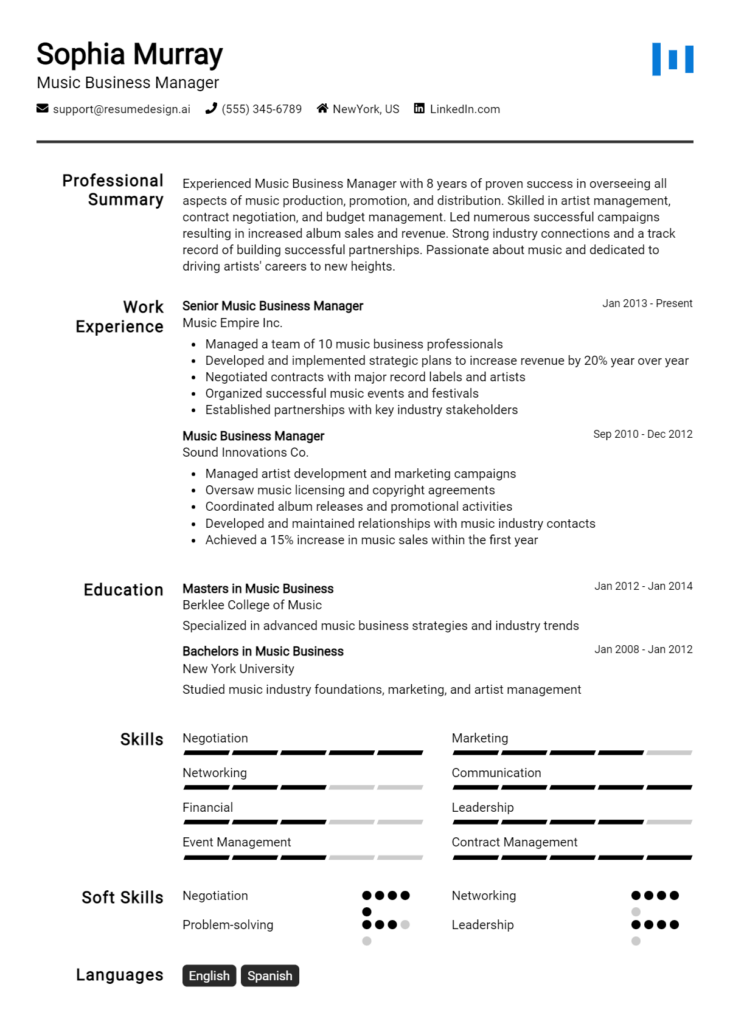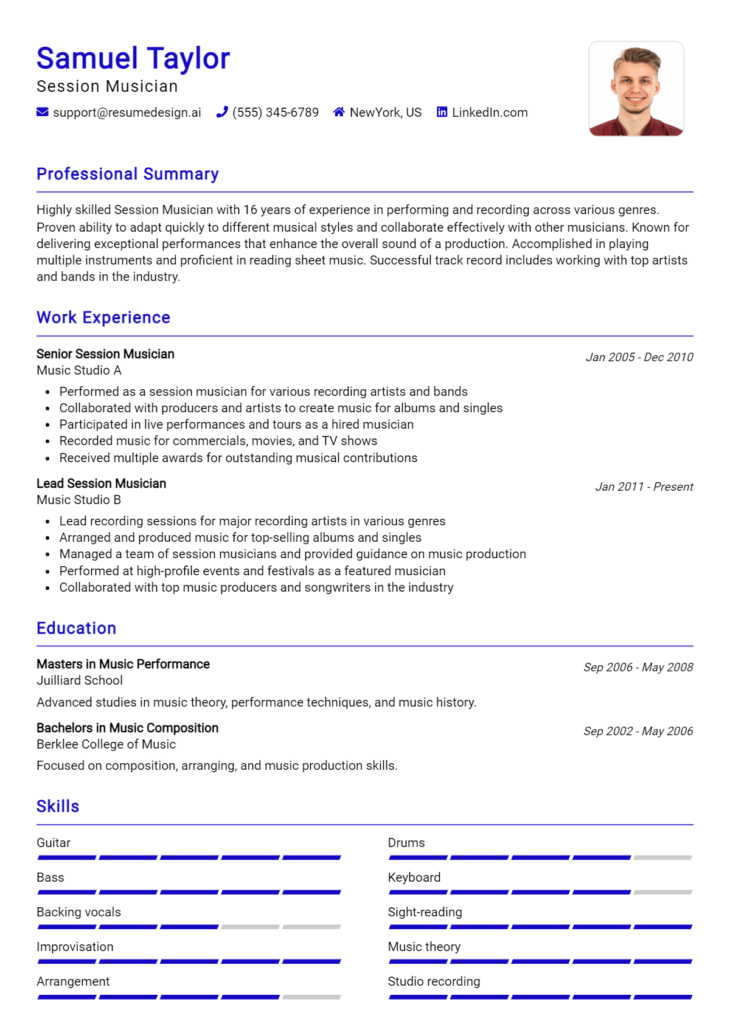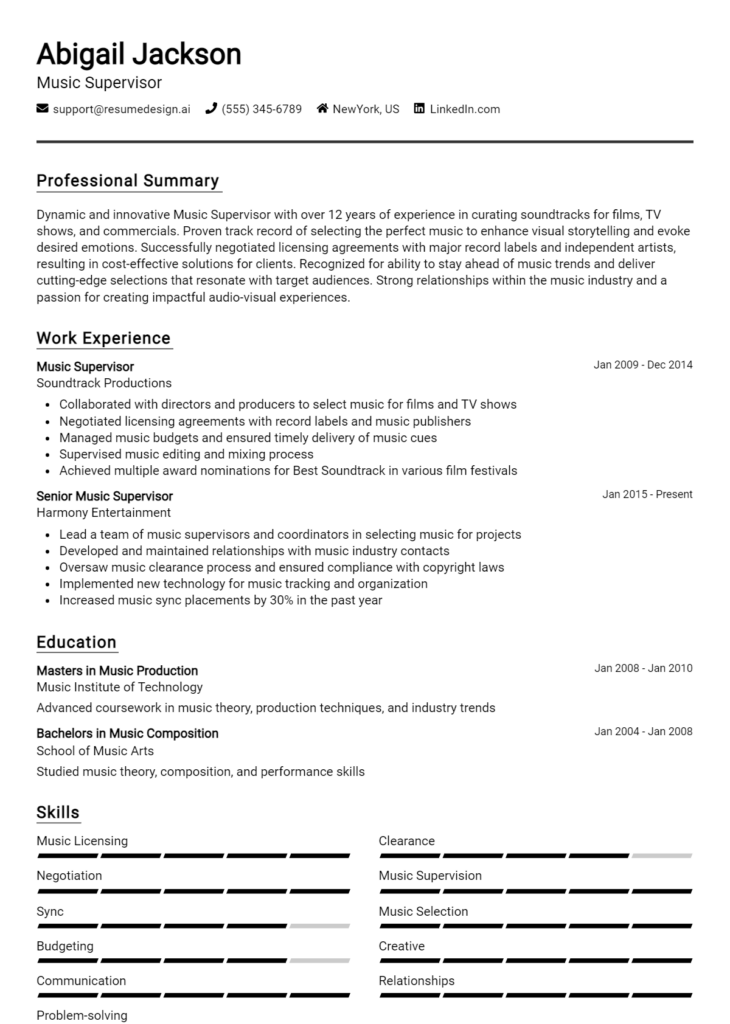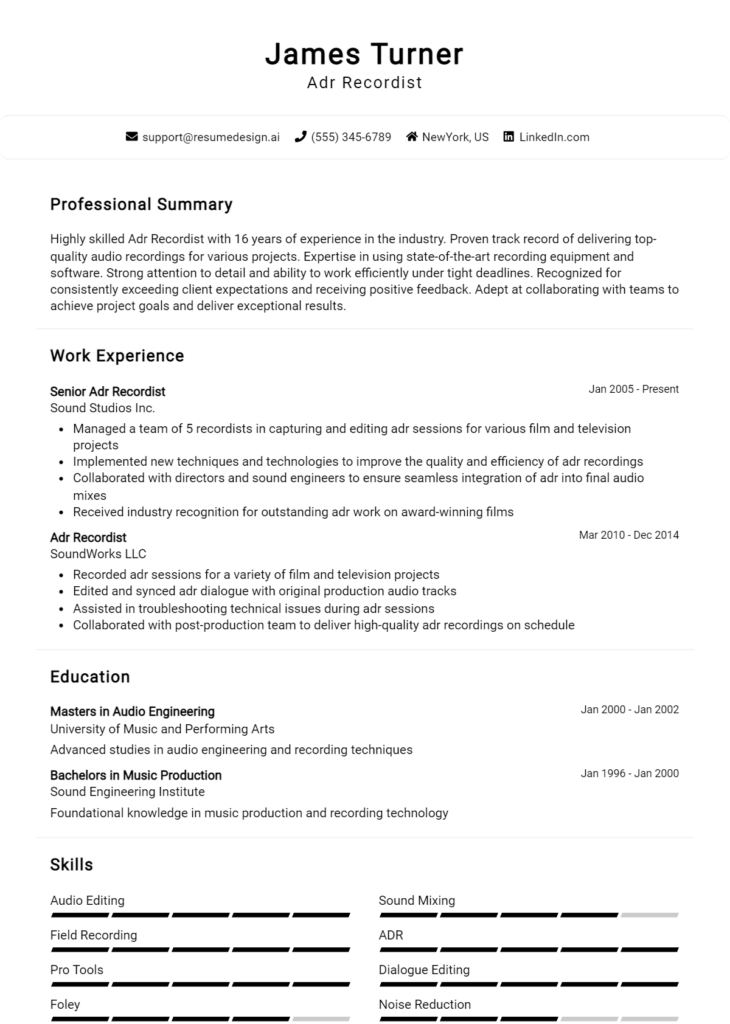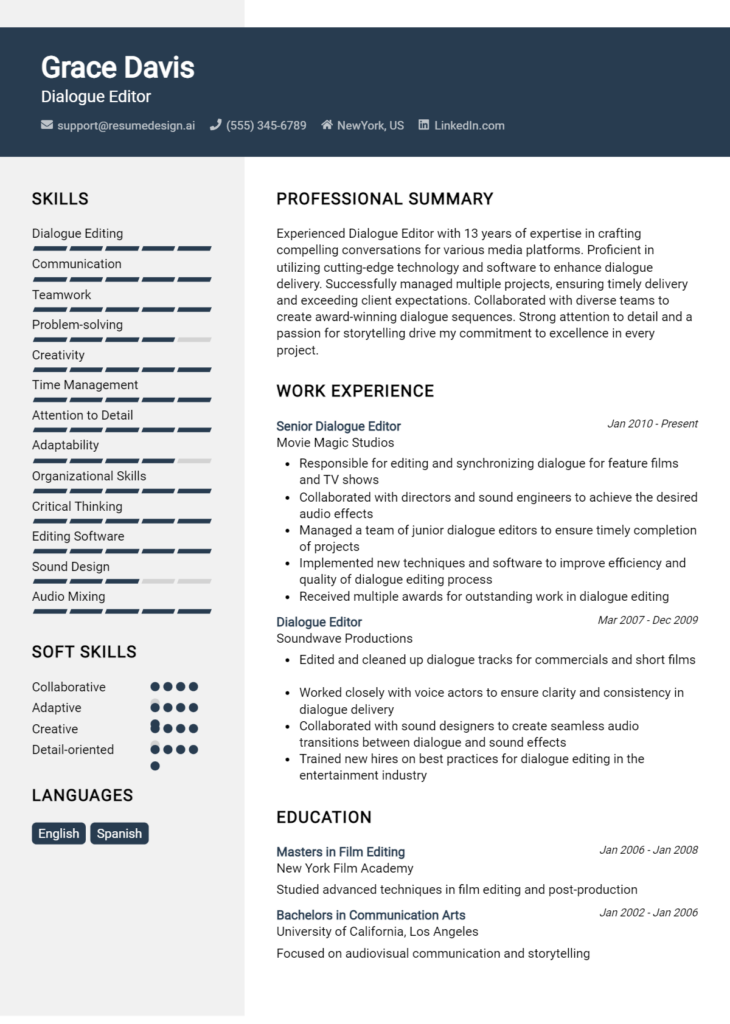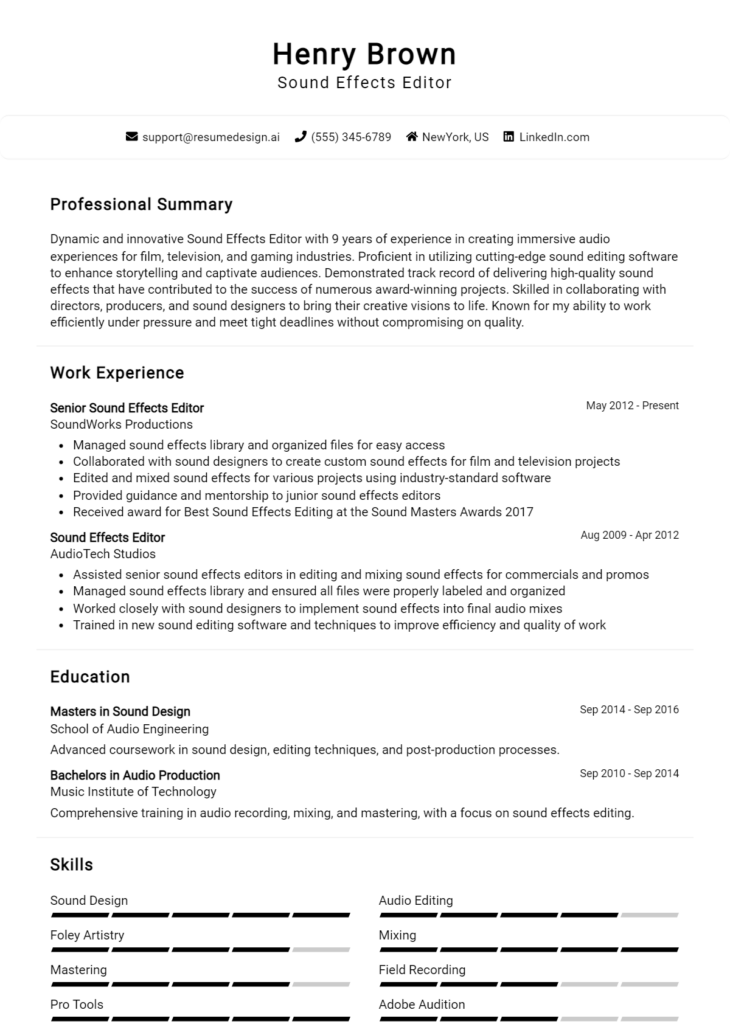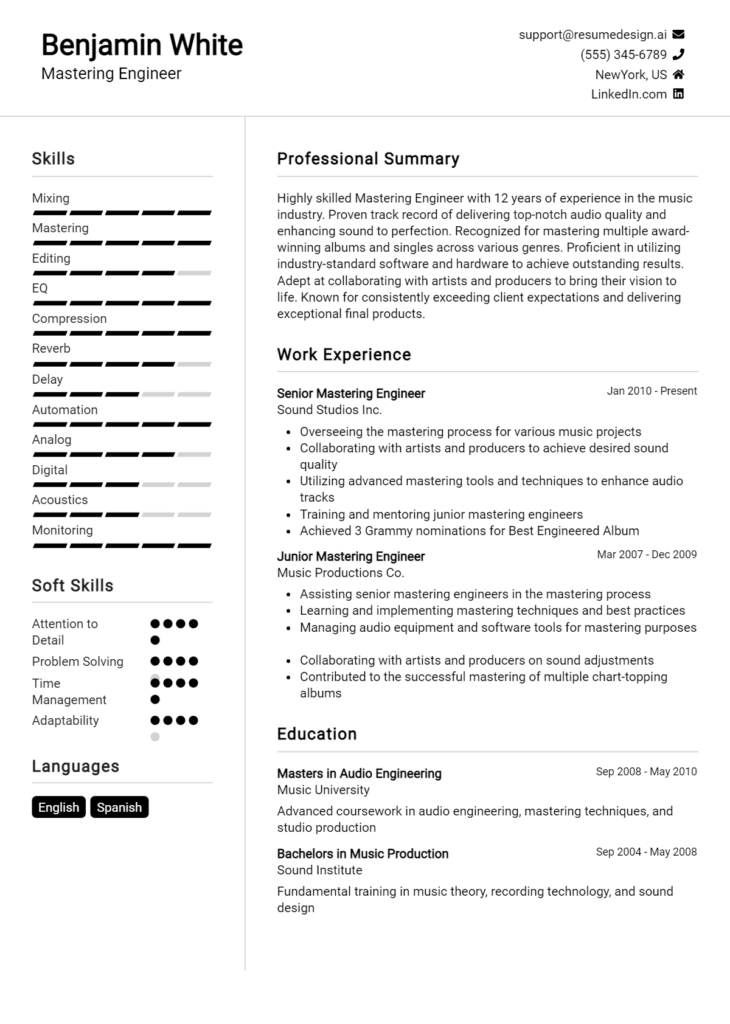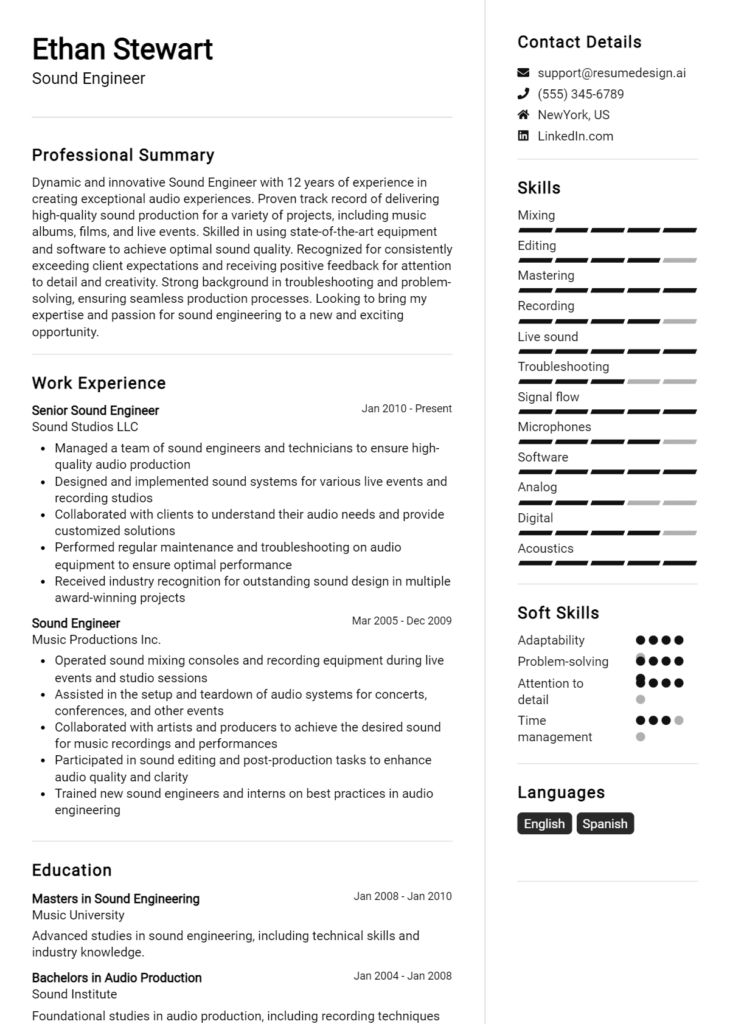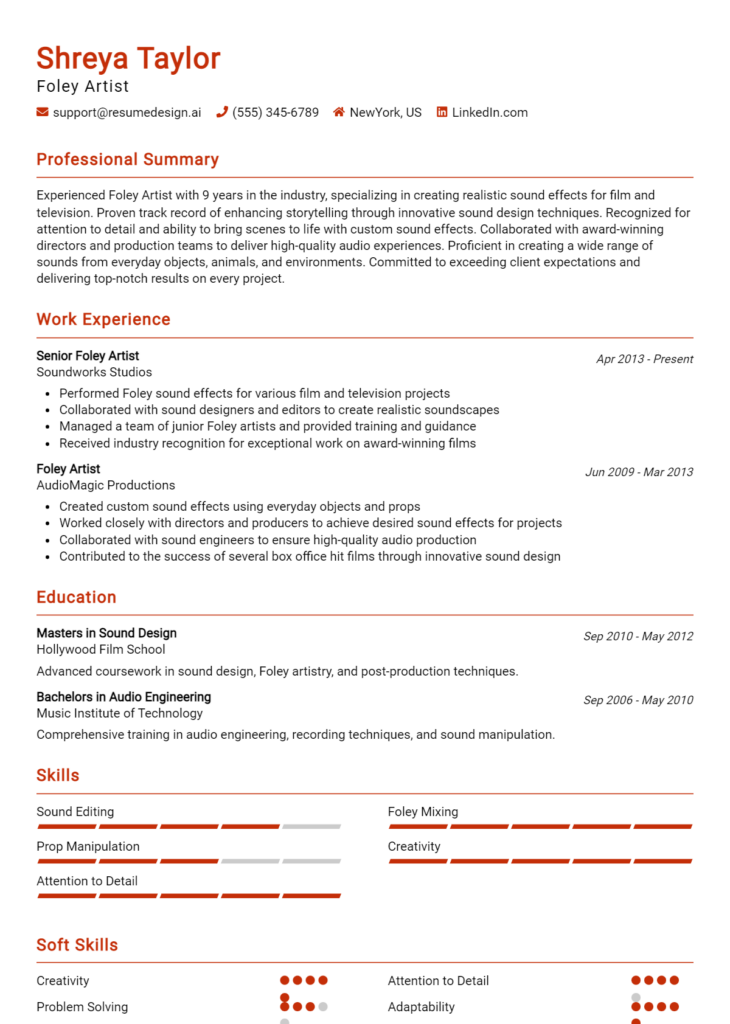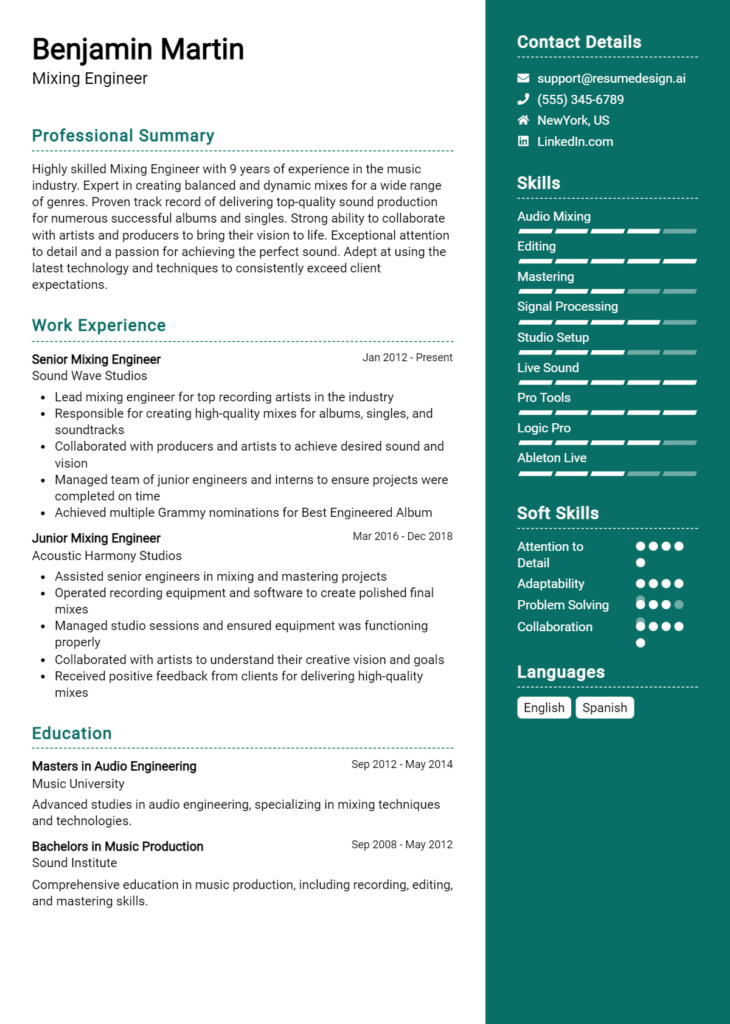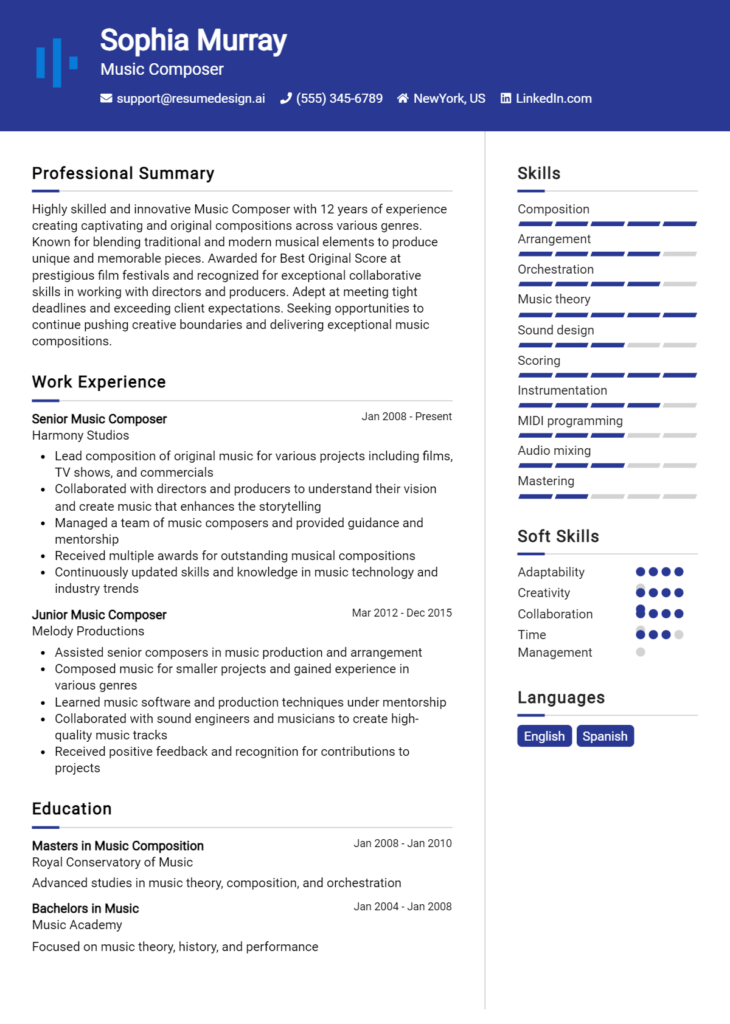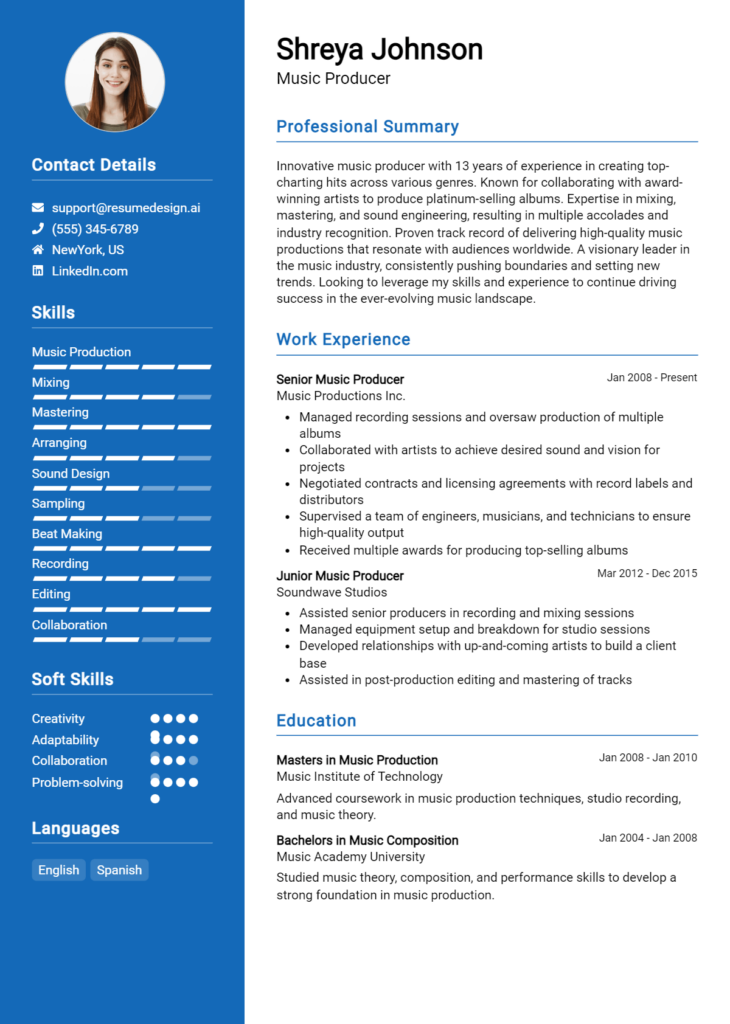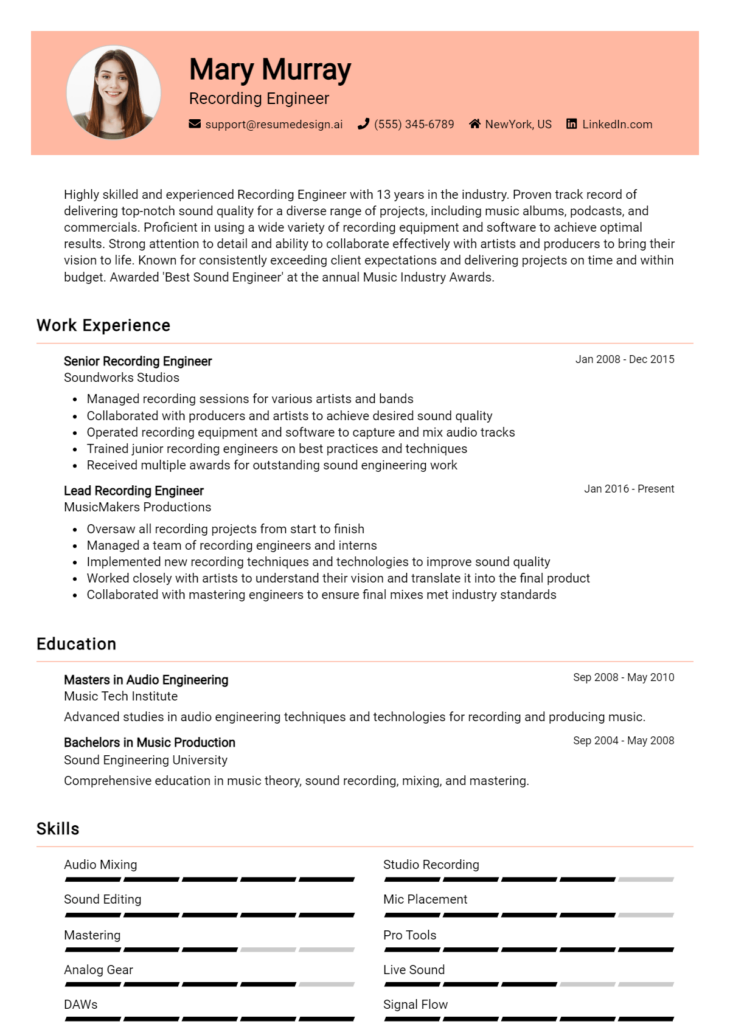Songwriter Core Responsibilities
A Songwriter is pivotal in creating compelling lyrics and melodies that resonate with audiences, bridging the gap between artistic vision and commercial viability. Key responsibilities include crafting original songs, collaborating with artists and producers, and adapting to various musical genres. Essential skills encompass technical proficiency in music composition, operational understanding of the music industry, and problem-solving abilities to overcome creative challenges. Demonstrating these competencies in a well-structured resume can significantly enhance a songwriter's chances of success within the organization.
Common Responsibilities Listed on Songwriter Resume
- Compose original lyrics and melodies for various music genres
- Collaborate with artists, producers, and other songwriters
- Participate in songwriting sessions and workshops
- Revise and refine songs based on feedback
- Research music trends to inform songwriting
- Prepare and present song demos to stakeholders
- Maintain knowledge of copyright laws and music publishing
- Contribute to songwriting for commercials, film, and television
- Network with industry professionals to build relationships
- Manage time effectively to meet deadlines
- Utilize music software and technology for composition
- Document and organize song ideas and drafts
High-Level Resume Tips for Songwriter Professionals
In the competitive world of songwriting, a well-crafted resume is essential for standing out in a crowded field. For many Songwriter professionals, the resume serves as the first impression they make on potential employers, making it critical to reflect their unique skills and achievements effectively. A strong resume not only showcases your creative talents but also communicates your professional journey and accomplishments. This guide will provide practical and actionable resume tips specifically tailored for Songwriter professionals, helping you to present your artistry and experience in the best light possible.
Top Resume Tips for Songwriter Professionals
- Tailor your resume to each job application by carefully reading the job description and incorporating relevant keywords.
- Highlight your songwriting experience prominently, including details about the genres you specialize in and notable collaborations.
- Quantify your achievements where possible, such as mentioning the number of songs recorded, chart placements, or awards received.
- Include a dedicated section for your songwriting skills, such as proficiency in music theory, lyric writing, and melody composition.
- Showcase any relevant education or training in music theory, composition, or related fields that support your expertise.
- List your performance experience if applicable, as it can demonstrate your versatility as a songwriter.
- Provide links to your portfolio or recordings, allowing employers to easily access samples of your work.
- Keep the design clean and professional, making sure that it is easy to read and visually appealing.
- Use active language and strong action verbs to convey your contributions and impact in previous roles.
- Keep your resume concise, ideally one page, focusing on the most relevant information to grab attention quickly.
By implementing these tips, you can significantly increase your chances of landing a job in the songwriter field. A polished and tailored resume will not only highlight your talents and achievements but also demonstrate your professionalism, making you a compelling candidate in a competitive industry.
Why Resume Headlines & Titles are Important for Songwriter
In the competitive world of songwriting, a well-crafted resume is essential for capturing the attention of hiring managers. Resume headlines and titles play a crucial role in this process, as they serve as the first impression for potential employers. A strong headline can immediately grab attention, summarizing a candidate's key qualifications in one impactful phrase. It should be concise, relevant, and directly related to the job being applied for, effectively showcasing the songwriter's unique skills and experiences. By creating a compelling headline, songwriters can differentiate themselves from the competition and increase their chances of landing their desired roles in the music industry.
Best Practices for Crafting Resume Headlines for Songwriter
- Make it concise: Aim for a headline that is brief yet informative, ideally no more than 10 words.
- Be role-specific: Tailor the headline to reflect the specific songwriting position you are applying for.
- Highlight key skills: Incorporate essential skills or qualifications that make you a standout candidate.
- Use action words: Start with strong action verbs that convey confidence and initiative.
- Incorporate achievements: If possible, mention notable accomplishments or recognitions that enhance your credibility.
- Stay relevant: Ensure the headline aligns with the job description and requirements of the position.
- Avoid clichés: Steer clear of overused phrases that lack originality and impact.
- Test for clarity: Make sure your headline is easy to understand and conveys your professional identity.
Example Resume Headlines for Songwriter
Strong Resume Headlines
Award-Winning Songwriter with 10+ Years of Experience in Pop Music
Creative Lyricist Specializing in Emotional Ballads and Storytelling
Versatile Songwriter with Proven Success in Chart-Topping Hits
Collaborative Music Creator with Expertise in Multiple Genres
Weak Resume Headlines
Songwriter Looking for Opportunities
Music Professional Seeking Work
Experienced in Writing Songs
Strong headlines are effective because they encapsulate a songwriter's unique value proposition, providing specific information that resonates with hiring managers. They highlight relevant skills, experiences, and accomplishments that make the candidate an ideal fit for the role. In contrast, weak headlines fail to impress as they lack specificity, creativity, and relevance, leaving hiring managers with little motivation to explore the rest of the resume. A compelling headline sets the tone for the entire application and can significantly influence a candidate's chances of being noticed in a crowded field.
Writing an Exceptional Songwriter Resume Summary
A resume summary is a vital component for any songwriter looking to make an impact in the competitive music industry. It serves as a snapshot of your professional identity, quickly capturing the attention of hiring managers by highlighting your key skills, relevant experience, and notable accomplishments. A strong summary not only showcases your unique artistic voice but also demonstrates your understanding of the role you're applying for, making it essential for standing out. It should be concise, impactful, and tailored specifically to the job at hand, ensuring that the reader is drawn in and eager to learn more about your talents.
Best Practices for Writing a Songwriter Resume Summary
- Quantify achievements: Use numbers to demonstrate your success, such as the number of songs published or placements achieved.
- Focus on skills: Highlight relevant skills like lyric writing, melody composition, or collaboration with artists and producers.
- Tailor the summary: Customize your summary for each application to align with the specific job description and requirements.
- Be concise: Aim for 2-4 sentences that effectively communicate your qualifications without overwhelming the reader.
- Showcase diversity: If applicable, mention your versatility in different genres or styles to appeal to a broader audience.
- Use action verbs: Start sentences with powerful verbs that convey your contributions, such as "crafted," "collaborated," or "produced."
- Include industry knowledge: Mention any relevant experience in the music industry, such as working with labels or performing live.
- Highlight awards or recognitions: If you've received accolades or nominations, including these can enhance your credibility.
Example Songwriter Resume Summaries
Strong Resume Summaries
Detail-oriented songwriter with over 10 years of experience in the music industry, having written over 50 songs for chart-topping artists. Known for crafting emotionally resonant lyrics and catchy melodies that have led to 10 Billboard Hot 100 placements.
Innovative and versatile songwriter proficient in multiple genres, including pop, country, and R&B. Successfully collaborated with Grammy-winning producers, resulting in three tracks featured on major label albums and two songs nominated for industry awards.
Dynamic songwriter and musician with a proven track record of creating hit songs that resonate with audiences. Achieved over 1 million streams on Spotify for original tracks, with a focus on storytelling and authentic expression.
Weak Resume Summaries
Songwriter with experience in music and a passion for creating songs. I have written various songs and worked with different artists.
Creative individual looking for opportunities in songwriting. I enjoy writing and have some experience in the music field.
The strong resume summaries are effective because they provide specific, quantifiable achievements and highlight relevant skills that align with the songwriting role. They demonstrate a clear understanding of the industry and the candidate's contributions, making them compelling to potential employers. In contrast, the weak summaries lack detail and specificity, making it difficult for hiring managers to gauge the candidate's true capabilities and relevance to the position.
Work Experience Section for Songwriter Resume
The work experience section of a songwriter's resume is a crucial component that provides insight into the candidate's professional journey and capabilities. This section not only highlights the songwriter's technical skills, such as music composition, lyric writing, and production, but also illustrates their ability to manage collaborative teams of musicians, producers, and other creatives. By quantifying achievements—like chart rankings, streaming numbers, or successful collaborations—candidates can effectively demonstrate their contributions to commercial successes and align their experiences with industry standards. Ultimately, this section serves as a testament to the songwriter's proficiency in delivering high-quality products that resonate with audiences and industry professionals alike.
Best Practices for Songwriter Work Experience
- Use action verbs to describe your contributions, such as "composed," "collaborated," or "produced."
- Highlight specific technical skills relevant to songwriting, such as proficiency in music software or instrument expertise.
- Quantify your achievements, such as the number of streams, album sales, or chart positions attained.
- Detail collaborative projects and partnerships to showcase teamwork and communication skills.
- Align your experiences with industry standards by using terminology familiar to music professionals.
- Include any awards or recognitions received to validate your contributions and expertise.
- Tailor your work experience descriptions to reflect the type of songwriting you wish to pursue.
- Maintain a concise and engaging narrative that captures the essence of your contributions.
Example Work Experiences for Songwriter
Strong Experiences
- Co-wrote and produced a single that reached the Top 10 on the Billboard Hot 100, achieving over 1 million streams in its first month.
- Collaborated with a Grammy-winning artist to create an EP that garnered critical acclaim and received a nomination for Best Contemporary Pop Album.
- Led a team of five musicians in the production of a soundtrack for a major motion picture, resulting in a soundtrack that debuted at number one on iTunes.
- Developed a songwriting workshop that trained over 50 aspiring artists, many of whom have since signed with major labels.
Weak Experiences
- Worked on various music projects and contributed to some songs.
- Helped a friend with their album and did some writing.
- Participated in songwriting sessions with no clear outcomes or contributions.
- Wrote lyrics for a few songs without noting any success or recognition.
The examples provided illustrate the difference between strong and weak experiences. Strong experiences are characterized by quantifiable outcomes, such as chart success or industry recognition, and clearly demonstrate the candidate's technical skills and collaborative efforts. In contrast, weak experiences lack specificity, measurable achievements, and fail to convey the songwriter's impact or contributions, making them less compelling to potential employers.
Education and Certifications Section for Songwriter Resume
The education and certifications section of a Songwriter Resume plays a crucial role in showcasing a candidate's academic foundation, relevant industry certifications, and commitment to continuous learning. This section not only highlights the educational background that informs a songwriter's craft but also demonstrates their dedication to honing their skills through formal training and recognized qualifications. By detailing relevant coursework, specialized training, and industry-recognized certifications, candidates can significantly enhance their credibility and align themselves more closely with the expectations of potential employers in the music industry.
Best Practices for Songwriter Education and Certifications
- Focus on relevant degrees or programs that pertain directly to songwriting, music production, or composition.
- Include industry-recognized certifications that demonstrate expertise in specific areas such as music theory, digital audio production, or copyright law.
- Detail any relevant coursework that highlights skills in lyric writing, melody composition, or music arrangement.
- Keep descriptions concise but informative, ensuring clarity in how each qualification relates to the songwriting profession.
- Prioritize advanced degrees or certifications that reflect a higher level of expertise or specialization in the field.
- Regularly update this section to reflect any new training or certifications acquired, maintaining a current and relevant profile.
- Showcase participation in workshops, masterclasses, or industry conferences that contribute to professional development.
- Consider including any notable mentors or instructors from whom you have learned, as this can enhance credibility.
Example Education and Certifications for Songwriter
Strong Examples
- Bachelor of Music in Songwriting, Berklee College of Music, 2020
- Certification in Music Production, Audio Engineering Institute, 2021
- Completed coursework in Lyric Writing and Composition at New York University, 2019
- Attended Songwriting Masterclass with Grammy-winning songwriter, 2022
Weak Examples
- Associate Degree in General Studies, Community College, 2018
- Certification in Basic Computer Skills, Online Course, 2020
- High School Diploma, Local High School, 2017
- Outdated Certification in Music Theory, obtained in 2010
The examples listed as strong reflect relevant educational qualifications and certifications that directly contribute to the skills required for songwriting, showcasing both academic and practical experience. In contrast, the weak examples lack direct relevance to the music industry, highlighting outdated or generic qualifications that do not enhance a candidate's appeal in the competitive field of songwriting. By prioritizing strong examples, candidates can effectively convey their dedication and preparedness for the role.
Top Skills & Keywords for Songwriter Resume
As a songwriter, having a diverse set of skills is crucial for standing out in a competitive industry. A well-crafted resume that highlights both hard and soft skills can significantly increase your chances of landing opportunities in music. Hard skills demonstrate your technical abilities and knowledge of music theory, production, and instrumentation, while soft skills reflect your creativity, communication, and collaboration capabilities. Together, these skills paint a comprehensive picture of your qualifications, making your resume more compelling to potential employers. Emphasizing your unique talent and experiences through these skills can help you connect with the right audience and showcase your potential as a songwriter.
Top Hard & Soft Skills for Songwriter
Soft Skills
- Creativity
- Collaboration
- Communication
- Adaptability
- Emotional Intelligence
- Time Management
- Problem-Solving
- Open-Mindedness
- Attention to Detail
- Networking
Hard Skills
- Music Theory
- Lyric Writing
- Composition
- Music Production Software (e.g., Ableton, Logic Pro)
- Vocal Arrangement
- Instrument Proficiency (e.g., guitar, piano)
- Audio Engineering
- Understanding of Music Genres
- Performance Skills
- Knowledge of Copyright Laws
By integrating these skills into your resume along with relevant work experience, you can create a powerful narrative that showcases your expertise and passion for songwriting.
Stand Out with a Winning Songwriter Cover Letter
Dear [Hiring Manager's Name],
I am writing to express my enthusiasm for the Songwriter position at [Company's Name] that I recently discovered on [Where You Found the Job Listing]. With a passion for storytelling through music and a strong background in various genres, I am excited about the opportunity to contribute my creativity and unique voice to your team. My experience in collaborating with artists and producers has equipped me with the skills necessary to craft compelling lyrics and melodies that resonate with audiences.
Throughout my career, I have honed my craft by writing over [number] songs, many of which have been featured in [specific platforms, events, or notable placements]. My ability to adapt my writing style to fit different artists and projects has been a key factor in my success. I pride myself on my collaborative approach, often working closely with musicians to bring their visions to life while infusing my own creative flair. I believe that great songs are born from a fusion of ideas, and I am committed to creating a supportive and innovative environment for collaboration.
In addition to my songwriting experience, I possess a solid understanding of the music industry landscape, including trends, audience engagement, and digital platforms. This knowledge allows me to tailor my work to meet the needs of both artists and listeners, ensuring that my contributions are not only artistic but also commercially viable. I am particularly drawn to [Company's Name] because of its commitment to fostering emerging talent and pushing creative boundaries, and I am eager to be part of a team that shares my passion for impactful music.
Thank you for considering my application. I am excited about the possibility of bringing my songwriting skills to [Company's Name] and contributing to your mission of creating unforgettable music. I look forward to the opportunity to discuss how my experiences and vision align with your needs.
Sincerely,
[Your Name]
[Your Contact Information]
[Your LinkedIn Profile or Website]
Common Mistakes to Avoid in a Songwriter Resume
When crafting a resume as a songwriter, it's essential to present your unique talents and experiences effectively. However, many aspiring songwriters make common mistakes that can diminish their chances of landing opportunities in the music industry. A well-organized and impactful resume can set you apart from the competition, so it's crucial to avoid these pitfalls that could undermine your efforts.
Lack of Specificity: Failing to tailor your resume to specific roles can make it seem generic. Highlight relevant skills and experiences that align with the position you’re applying for.
Overly Complex Language: Using jargon or overly complicated phrases can confuse readers. Keep your language clear and concise to ensure your message resonates.
Ignoring Achievements: Simply listing job duties without showcasing your accomplishments can make your resume bland. Include quantifiable achievements, such as chart positions, awards, or successful collaborations.
Neglecting to Include Collaborations: Collaboration is a significant aspect of songwriting. Not mentioning co-writes or partnerships can understate your experience. Always highlight notable collaborations to show your versatility.
Omitting Contact Information: Forgetting to include your contact details can hinder potential opportunities. Ensure your email, phone number, and relevant social media links are easy to find.
Using an Unprofessional Email Address: An unprofessional email can leave a negative impression. Choose an email address that reflects your brand and is easily recognizable.
Poor Formatting: A cluttered or unorganized layout can detract from your content. Use clear headings, bullet points, and a consistent format to enhance readability.
Failure to Keep it Updated: An outdated resume can misrepresent your current skills and experiences. Regularly update your resume with new projects, placements, or skills to keep it relevant.
Conclusion
As a songwriter, your resume is your calling card in a competitive industry. It should effectively showcase your creative talents, experiences, and unique style. Key points to consider include highlighting your songwriting credits, collaborations, and any notable performances or recordings. Be sure to include specific genres you excel in and any awards or recognitions that set you apart.
Additionally, focus on presenting your skills in a way that captures your artistic voice. Use action verbs and concise descriptions to convey your contributions to various projects. Don't forget to tailor your resume for each opportunity, emphasizing the aspects of your work that align with the specific role or organization you are targeting.
Finally, as you refine your Songwriter Resume, consider utilizing available resources to enhance its effectiveness. Take advantage of resume templates to structure your information clearly. An easy-to-use resume builder can streamline the creation process and help you design a visually appealing document. Explore resume examples for inspiration and insight into what works best for songwriters. And don't overlook the importance of a strong introduction; check out cover letter templates to accompany your resume.
In conclusion, take the time to review your Songwriter Resume critically. Make sure it reflects your journey as a creative artist and effectively communicates your potential to future collaborators and employers. Start crafting your standout resume today!

